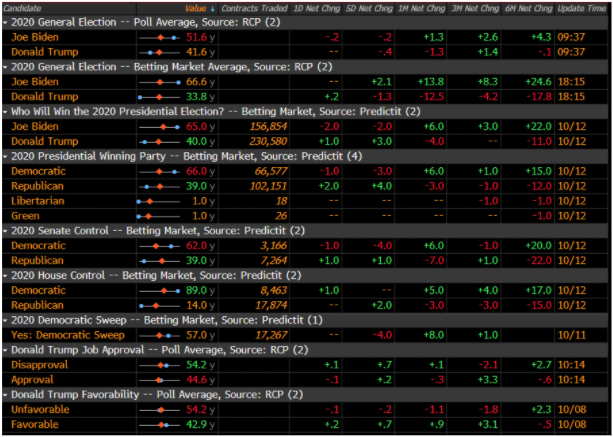The US election remains a focal point as November 3 looms. Meanwhile, a hefty earnings slate is in view and is expected to reflect the ongoing vagaries of the effects of the pandemic on various sectors of the economy. The significance of the reports might be lessened by the uncertainties over the election and what those results might mean for companies over the next four years.
A look at how the US election race is panning out
The US election presidential polls can be useful to predict how popular a candidate is across the country as a whole, however like every indicator it cannot always predict the outcome. The majority of polls so far present a Biden victory with a divided congress to be the most likely scenario. Joe Biden has been ahead of Donald Trump in most national polls since the start of the year.
 RealClearPolitics poll
RealClearPolitics poll
However today’s article is not in regards to the outcome but in regards to current markets positioning ahead of the election as well as its future response to each possible outcome.
While we have been facing an overall weak Dollar in the second half of the year, the proclivity for capital being safe harboured in US Treasuries means this is hinged on the global growth outlook establishing a sustainable improving trend, and that in turn may hinge on the world getting through the Covid crisis. However the upcoming US election presents risks too, particularly given the perceived chance of the election being contested.
Markets are anticipating another US fiscal package, although the timing remains uncertain, and the size and scope of it will be dependent on the election result. Wall Street narratives suggest that US stock markets are pricing in a blue wave on November 3, with Democrats sweeping the House, Senate and Presidency, which would result in many trillions of Dollars in fiscal support.
So far in October Biden’s lead in the polls has deducted the risk of a contested outcome and hence supported the US Equity market to recover since September (after the 1st debate), but also drove the risk sensitive Yen. This comes in contrast with the historical reaction of Stock markets in prior elections.
Historically, the stock market slows down and shows a weaker performance in the period leading up to an election, according to a study from US Bank. On average, the equity market showed a less than 6% gain during election years compared with an 8.5% gain in any other given year.
How could the stock market respond to a Biden win (Democrats)?
In the short term a Democratic win would support optimism as it would reflect an additional huge stimulus package. However, a blue wave outcome could also signal the prospect of higher taxes on businesses and rich people, something that could lead to a potential Equity market pullback. Biden’s tax proposals are a means of paying for some portion of his spending initiatives such as health plans, housing support plans, jobs creation in the American auto industry and on sustainable energy infrastructure and rise of minimum wage.
Hence not everything is black and white, as tax proposals could boost economic growth while on a foreign level they would trigger a more stable foreign approach as he ambasses a more conciliatory agenda for global relations. Having all this in mind the US major indices such as S&P 500, for example, remain close to record highs despite Biden’s tax policies, something that could imply that market participants are not necessarily sure that a Democrat victory would weigh on Equities. However if markets fall on Biden’s election this could in the near term boost the US Dollar into a rally.
How could the stock market respond to a Trump win (Republicans)?
History tells us that it is still possible that we will see a Trump win, even though it looks unlikely based on polls. Since 1928, the party that controlled the White House has won 90% of the time. The times that this happened the largest US stocks have risen in the 3 months prior to the election. Let’s not forget that Trump’s policies are geared towards American manufacturers and Wall Street (in contrast with Biden) – which could mean that Stocks could rise if the incumbent remains in office.
According to Nathaniel Lie: “Across the last seven presidential election cycles, average gains for major indexes such as the S&P 500 and Dow Jones showed positive returns in the six months before Election Day. The only exception was the 2008 financial crisis that rocked the stock market just ahead of November.” – despite that, the stock market tends to perform on average much better during Democratic presidencies than Republican ones.
Click here to access the Economic Calendar
Andria Pichidi
Market Analyst
Disclaimer: This material is provided as a general marketing communication for information purposes only and does not constitute an independent investment research. Nothing in this communication contains, or should be considered as containing, an investment advice or an investment recommendation or a solicitation for the purpose of buying or selling of any financial instrument. All information provided is gathered from reputable sources and any information containing an indication of past performance is not a guarantee or reliable indicator of future performance. Users acknowledge that any investment in Leveraged Products is characterized by a certain degree of uncertainty and that any investment of this nature involves a high level of risk for which the users are solely responsible and liable. We assume no liability for any loss arising from any investment made based on the information provided in this communication. This communication must not be reproduced or further distributed without our prior written permission.



















